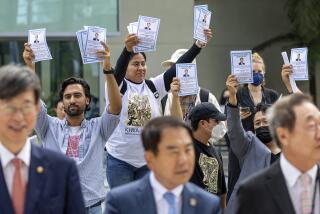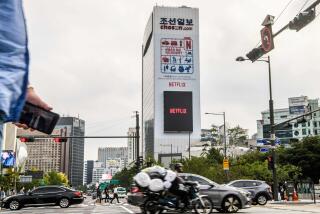Sony wrestles with how to market âInterviewâ amid geopolitics, scandal
Stern security guards kept a close eye on guests. Stars were kept away from the press. And the usual red carpet fanfare was largely eliminated.
When Sony Pictures held the premiere for its controversial new North Korea-themed comedy, âThe Interview,â in downtown Los Angeles on Thursday night, it avoided many of the trappings of a Hollywood event.
The muted affair hinted at a larger paradox surrounding the Christmas release of âThe Interview: How does a studio release a movie with the requisite hoopla when everything about it is more fraught than festive?
Sony Picturesâ âThe Interview,â directed by Seth Rogen and longtime collaborator Evan Goldberg, centers on a CIA plot to kill North Korean leader Kim Jong Un via a bumbling American talk show host, played by James Franco, and his producer, played by Rogen. But what could have been a silly romp has turned into something much more serious.
North Korea, which sees âThe Interviewâ as part of a propaganda war by the West, has been condemning the film since the summer â at one point an official called it âan act of warâ and vowed revenge. In recent weeks Sony has been hit by a devastating cyberattack that some law enforcement officials believe North Korea orchestrated as a retaliatory act. The hacking continues to expose embarrassing emails from top executives and has shaken the insular culture of Hollywood.
In the process, the scandal shows what happens when powerful forces in Hollywood and geopolitics collide â when a company is caught between wanting to support its filmmakersâ edgy vision but, as a subsidiary of a large corporate conglomerate, also must weather the fallout.
Sony Pictures executives apparently were concerned about âThe Interviewâ before North Korea began protesting the film this summer, engaging in an internal debate over issues such as release date, publicity talking points and the nature of the film itself that grew more heightened as the controversy boiled over.
According to newly disclosed emails reviewed by The Times, a top studio executive worried about the filmâs original release date of Oct. 10 last May, a month before North Korea began protesting the movie.
âWhether intentional or coincidence, we are releasing âThe Interviewâ on 10/10/14 â one of the most important national holidays in North Korea, which is the anniversary of the establishment of the Workerâs Party,â Keith Weaver, the executive vice president of worldwide government affairs for Sony Pictures, wrote to the companyâs general counsel Leah Weil on May 20. (The release date was first changed on Aug. 7, and for unclear reasons; the studio said publicly it was to give the movie a bigger platform on Christmas.)
An email between Japanese and Australian Sony executives on June 23, before the issue began to bubble up, also noted that the movie posed an issue for Sony Corpâs top executive.
âMr. Kaz Hirai, CEO, was very much concerned about this film especially when the Japanese government is negotiating with the North Korean government regarding the returning of the kidnapped Japanese to Japan,â Noriaki Sano wrote to Stephen Basil-Jones, referring to the long-running showdown over at least 13 Japanese citizens, noting that Hirai and Sony Entertainment CEO Michael Lynton had spoken.
Sony declined to comment for this story.
The first signs of a North Korean backlash to âThe Interviewâ occurred on June 20, when the head of a group known as the Center for Korean-American Peace, Kim Myong-chol, criticized the movie in an interview with the Daily Telegraph. It began to take shape in earnest on June 27, when North Koreaâs U.N. ambassador, Ja Song Nam, said the film was tantamount to âan act of warâ and threatened âa decisive and merciless countermeasure.â
At the time, Rogen, Goldberg and Sony decided to start screening the movie more widely to play down any political messages. The studio is now pushing ahead with that plan. Rogen is making the rounds on âThe Colbert Report,â âThe Tonight Show Starring Jimmy Fallonâ âLate Night With Seth Meyersâ and âLive With Kelly and Michaelâ in the next two weeks.
In company emails from June, a studio publicity executive suggested that filmmakers and talent play down any political angle in interviews.
If people are asked about whether or not they are âworried about repercussions on the world stageâ as a result of the film, the executive advises them to brush off the question by saying, âYou give us too much credit.â And if theyâre asked if the film is racist? âNo. Weâre calling out the absurdity of jingoism.â
Whether all the controversy will help or hurt the movie at the box office remains to be seen. Early surveys for the film indicate a total box office of $25 million to $30 million for the four-day Christmas weekend, a decent but far from spectacular total.
But perhaps more central is the political backlash. On Friday, the U.S. special representative for North Korea policy urged Pyongyang to stop being preoccupied with the film and concentrate instead on areas such as human rights and the economy. âI would encourage the North Korean leadership to focus on important aspects, rather than this movie,â new U.S. special representative for North Korea Sung Kim said in Beijing.
Federal prosecutors are also investigating whether the email hack, which has featured embarrassing exchanges from such figures as Sony Pictures chief Amy Pascal and producer Scott Rudin, was in fact mounted by North Korea.
Examination of the hacked emails suggest that Sony has reckoned with complicated feelings about the film, excited about the possibilities of a real-world villain but also concerned about the implications.
In an email exchange in mid-May, Dwight Caines, Sonyâs president of theatrical marketing, responded to Rogenâs inquiry about the release plans. â[T]hat Kim is a real guy is what makes this even more interesting and crazy. This is the other kind of positioning we need to embrace. The movie is doing something bold that Iâm not sure any other movie has done before taking on as its subject matter a real persona of this notoriety.â
But second thoughts were also creeping up. On June 17 â three days before the first North Korea public comments â Sonyâs Motion Picture Group President Doug Belgrad discussed executivesâ concerns with Lynton.
âI understand this is a delicate issue and will do whatever I can to help address all of the issues and concerns,â Belgrad wrote to him in the email. He went on to say that heâs researching whether âthere is precedent on depicting and/or killing a living leader on filmâ and was looking at various other examples, such as Charlie Chaplinâs âThe Great Dictatorâ and Trey Parker, Matt Stone and Pam Bradyâs âTeam America: World Police.â
In a lengthy exchange, Pascal and Rogen discussed whether a gory scene featuring Kim Jong Un should be changed due to concerns about North Korea, and how that will play in the media.
âThis is now a story of Americans changing their movie to make North Koreans happy. That is a very damning story,â Rogen wrote, and asks Pascal to moderate the required changes. In the end, the changes were relatively modest.
The question of Sonyâs creative involvement in the North Korean aspects of the movie has been a key one. The narrative the studio and filmmakers has put forth is that Sony had contemplated a fictional villain but that Rogen and Goldberg were set on Kim Jung Un. But an internal email suggests otherwise--it implies that Sony specifically had North Korea added to the script.
As part of a set visit by journalists last year, a publicist wrote in a memo to top executives that screenwriter Dan Sterling told reporters that the âoriginal script had a fake dictator. While on the set of [Rogenâs] âNeighbors,â a Sony exec said they should make it Kim Jong Un so they did.â
The summary engendered this reply from Weaver, Sonyâs governmental affairs executive.
âI think thatâs problematic,â he wrote. âThere was much discussion on this and a statement like this makes it sound very Sonycorp directed versus talent desire ... Perhaps we [Sony] were insistent or perhaps it was a consensus, but I think itâs a challenge to put the company/our parent company out there this way.â
Julie Makinen contributed to this report from Beijing and Saba Hamedy contributed from Los Angeles
More to Read
Only good movies
Get the Indie Focus newsletter, Mark Olsen's weekly guide to the world of cinema.
You may occasionally receive promotional content from the Los Angeles Times.












